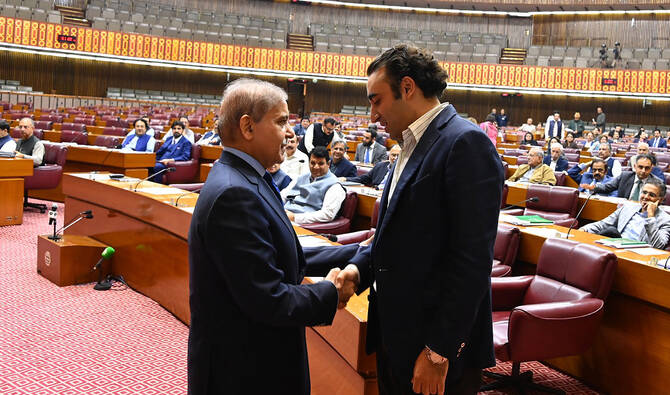ISLAMABAD: Pakistan’s Rs9.5 trillion ($47 billion) “formula budget” for fiscal year 2022-23 will help bring economic stability and revive a stalled $6 billion International Monetary Fund (IMF) loan program, economists said on Friday.
The program, which was secured in 2019, has been on hold since earlier this year over policy breaches. Pakistan is expected to resume talks with the IMF soon, hoping for the revival of the bailout plan that would disburse around $1 billion tranche to the South Asian country. Islamabad has so far received $3 billion from the IMF.
Pakistan’s Finance Minister Miftah Ismail presented the budget for FY23 year, aiming for a 5 percent economic growth. The South Asian country is currently facing a balance-of-payment crisis, which has sparked concerns it could lead to a default-like situation if corrective measures were not taken.
The lower house of Pakistan parliament, the National Assembly, is likely to approve the budget as early as next week.
“This is a formula budget, in line with the IMF policy and directions to get the loan program revived,” Dr. Abid Qaiyum Suleri, a senior economist and executive director at Sustainable Development Policy Institute (SDPI) in Islamabad, told Arab News.
He said the government had tried to reduce its expenses and enhance income in the budget, which would “help revive the IMF loan program.”
Haroon Sharif, a former economic adviser to the government, said the government had imposed taxes on some non-productive assets like the real estate, which was a “good step.”
“But this will not help overhaul the overall economic structure,” Sharif told Arab News. “We need economic reforms to revive our economy and I don’t expect this from the current coalition government.”
Sharif said Pakistan had bought time till September from the IMF to take necessary to revive its loan program. “We will be seeing a mini-budget after September, bringing more taxes and inflation,” he added.
Another economist, Asif Arsalan Haider Soomro, called it a “pro-growth budget” and said the government had tried its best to protect the lower- and middle-income classes by granting them concessions in income tax.
“The direction of this budget is clear and will help bring stability,” he said. Soomro also believed the new budget would help revive the IMF program.
He said the government was taxing companies, banks and rich people in the budget, which would improve the economy. “The government should have levied tax on agricultural income too, but it was avoided to protect the government’s voter base,” he said.
While the finance minister said the budget would boost economic growth, control inflation and increase revenues, the opposition Pakistan Tehreek-e-Insaf (PTI) party said it would instead bring an “inflationary storm” in the country.
“The corrupt rulers have nothing to provide relief to the public,” PTI secretary-general Asad Umar said, accusing Finance Minister Ismail of telling “lies” in his budget speech.
“The economy is rapidly going down as sales of cement have gone down by 16 percent and foreign remittances by 6 percent during the period of the current government,” Umar added.

















